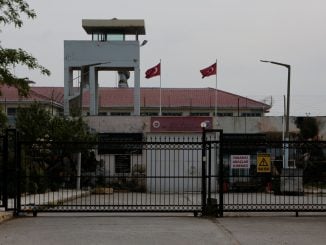ANKARA, Turkey — Turkey announced Tuesday that it will host a 10-day peace conference in Istanbul between Afghanistan’s warring sides later this month.
A Turkish Foreign Ministry statement said the conference will gather representatives of the Taliban and of the Afghan government, as well as Turkish, Qatari and U.N. officials who are co-organizing the meeting. The conference will be held between April 24 and May 4, the ministry said.
The surprise announcement came after a Taliban spokesman said Monday the religious militia would not attend a peace conference that had been tentatively planned to take place in Turkey later this week, putting U.S. efforts for a peace plan in jeopardy.
President Joe Biden has decided to leave American troops in Afghanistan beyond the May 1 deadline negotiated with the Taliban by the Trump administration, and has set the 20th anniversary of the Sept. 11 attacks as the new goal, a U.S. official said Tuesday.
Biden has been hinting for weeks that he was going to let the deadline lapse, and as the days went by it became clear that an orderly withdrawal of the remaining 2,500 troops was difficult and unlikely. A U.S. official provided details on Biden’s decision on condition of anonymity, speaking ahead of the announcement.
The Taliban have warned of “consequences” if Washington reneges on the deal.
The Turkish Foreign Ministry did not provide detailed information on the conference’s expected participants. It said the aim of the meeting would be to “accelerate and complement the ongoing intra-Afghan negotiations” that have been taking place in Doha, Qatar and to achieve a “just and durable political settlement.”
It said the conference agenda was the “subject of extensive consultations with the Afghan parties.”
“The conference will focus on helping the negotiating parties reach a set of shared, foundational principles that reflect an agreed vision for a future Afghanistan, a roadmap to a future political settlement and an end to the conflict,” the ministry said.
U.S. Secretary of State Antony Blinken previously said he wanted to see a peace agreement between Afghanistan’s warring sides finalized at a conference hosted by Turkey and attended by top officials from both the Taliban and the Afghan government.
Last month, Blinken gave both the Taliban and the Afghan government an eight-page proposed peace plan, which they were to discuss, revise and review and come to Turkey ready to cobble together an agreement.
Naeem said attendance at the conference and the Blinken peace proposal were being discussed “and whenever the discussion is completed we will share our final decision.”
Blinken’s peace plan called for protection of the rights of women and minorities and allowed for constitutional reform. It also called for the establishment of an interim administration, to be known as a “Peace Government.” There would also be an Islamic Advisory Council which would advise on all laws to ensure they are kept within Islamic tenets, an apparent concession to the Taliban.
Washington’s peace envoy, Zalmay Khalilzad, the man who negotiated the U.S. troop withdrawal under President Trump, has been shuttling between Doha, where the Taliban maintain a political office, and Kabul.
The U.S. Embassy in Kabul on Monday said Khalilzad had spent four days in the Afghan capital meeting with government officials and civil society leaders, underscoring “why it is important that both sides accelerate the peace process.”



